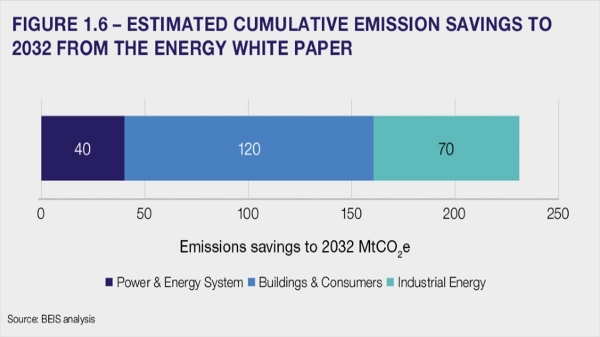19 Jan 2021

The government has put green recovery at the heart of its economic policy and its Energy White Paper explains how the UK will decarbonise all sectors and move to a net zero future. The report sets out the substantial action to be taken to cut emissions by 230 million metric tonnes over the next 10 years, while supporting 220,000 jobs.
The Energy White Paper builds on the Prime Minister's 10-point plan for a 'green industrial revolution' announced in November, to ensure the UK delivers affordably on its legally binding net zero 2050 commitment.
With the UK hosting both the G7 summit and COP26 climate summit this year, the government is positioning itself as an international climate leader and will follow-up on the Energy White Paper, with sector-specific decarbonisation strategies in the coming months.
In line with green energy policymaking, you'll be required to make some radical changes over the coming decade, such as shifting to zero-emission transport; making much wider use of net zero energy sources and finding new ways of heating your business.
The Energy White paper covers both domestic and business energy, but we're focussing on the major announcements that affect business and public sector organisations. Below we examine the key policies and commitments that will require you to change your approach to energy.
One of the boldest climate action policies announced by the government is a ban on the sale of new petrol and diesel cars and vans from 2030 – ten years sooner than originally planned. This is backed by funding to support industry and consumers to make the switch to cleaner vehicles.
Further details on the phase-out plans for petrol and diesel vehicles will be made clearer in the government's Transport Decarbonisation Plan, which is scheduled for publication in the coming months.
The Energy White Paper sets out a plan to invest £1.3 billion to accelerate the rollout of EV charging points across homes, streets and motorways, as well as another £1 billion to support the purchase and development of EVs themselves, such as funding for battery production.
Businesses are leading the transition to electric vehicles at pace – taking advantage of falling costs, technology advances and generous financial incentives to support their carbon reduction ambitions.
The government states that the biggest emissions savings laid out in the white paper are expected to come from buildings, as illustrated by the report's chart below.

Gas boilers will be gradually removed and replaced with cleaner alternatives. By the mid-2030s, the government hopes that all newly installed heating systems will be low carbon models or be appliances that are hydrogen-ready for future conversion to hydrogen supply. However, the government says it expects gas to continue to play a role for at least the next 10 years. In the near term, businesses can decarbonise their heating and power requirements by switching to a green business energy tariff where the energy supplied comes from renewable sources.
Decarbonisation of heat will require multiple solutions, including heat pumps, hydrogen, green gas and heat networks.
One of the key goals is a massive ramping-up of electric heat pump installation from 30,000 per year to 600,000 per year by 2028.
The potential for hydrogen heating is also being explored, with a proposal for a pilot hydrogen-heated town before 2030. One option could be to adapt existing gas infrastructure for hydrogen distribution, which relates to the government’s plan to consult on the role of "hydrogen-ready" boilers next year.
Energy efficiency is a cost effective method of decarbonising buildings, including using smart metering to help inform energy saving. As first announced in the Prime Minister's Ten Point Plan, the Public Sector Decarbonisation Scheme, launched in September 2020, is to be extended for a further year. The £1 billion first tranche of funding is expected to cut emissions by up to 1.3MtCO2e by 2032.
We are expecting a Heat & Buildings strategy, a UK Hydrogen strategy and an Industrial Decarbonisation strategy in the first half of 2021. This will provide more detail on the policy frameworks and funding for these sectors – we will be discussing these strategies with Government in the coming months.
Commitment to a new energy efficiency scheme for small businesses was also reiterated in the report, along with plans to consult on strengthening the Energy Savings Opportunity Scheme. Another key policy proposal is to strengthen implementation of tighter EPC standards for rented non-domestic buildings and consultation on the introduction of an energy performance-based rating scheme for large commercial and industrial buildings.
Decarbonising your buildings provides a quick win to achieve both rapid cost and carbon savings. The Public Sector Decarbonisation scheme (PSDS), now extended for a further year, provides capital funding for energy efficiency and heat decarbonisation projects within public sector non-domestic buildings, including central government departments and non-departmental public bodies in England. As approved suppliers to the scheme, our sister company, Centrica Business Solutions has a portfolio of energy efficiency solutions that can help you deliver end-to-end carbon reduction projects covering all aspects of energy efficiency and heat decarbonisation, including specialist support for all aspects of heat pump installation.
Learn more about ways to reduce energy spend, carbon emissions and improve operational efficiency.
To meet its commitment to generate emission-free electricity by 2050, the government aims to deliver an "overwhelmingly decarbonised" energy system by 2030,with 40GW of offshore wind by 2030. Emission-free electricity is seen as central to the UK's transition to a net zero economy, with demand expected to double due to transport and low carbon heat.
To enable a decarbonised power system, with increasing volumes of intermittent renewables, such as wind and solar, the government recognises a need for much greater flexibility in the decentralised energy system to maintain grid balance.
Government analysis estimates that "a smarter, more flexible system could unlock savings of up to £12bn per year by 2050". This is much higher than previous analysis on the value of a flexible system.
The Government will publish an updated Smart Systems and Flexibility Plan in spring 2021
This will pave the way for greater energy optimisation opportunities, such as monetising flexible power capacity from on-site generation with storage and EV charging – through a wider range of demand side response activities. We are at the forefront of aggregation with all size customers and types of technologies, regularly accessing different National Grid flexibility markets. Virtual Power Plants make it possible to maximise revenues by capturing multiple market opportunities using a mixed portfolio of generating and storage assets, as demonstrated by Centrica's Cornwall Local Energy Market report.
The quickest and easiest step all organisations can take to reducing their carbon emissions is by switching to a green business energy tariff.
Our 100% renewable electricity for businesses is independently certified by the Carbon Trust, which enables our customers to verify the origin of the renewable electricity as part of sustainability reporting requirements where needed and improve their environmental credentials. Corporate customers often combine this type of supply contract with flexible purchasing contracts.
The race to net zero requires urgent action and the role of business is critical to delivering on the UK's climate action commitments. There are many opportunities to contribute to the decarbonisation challenge, whatever the size or sector of your business. Developing your carbon reduction pathway can balance both your economic and environmental aims, while helping you to gain control over your energy to increase business resilience.
Related posts

29th January 2021
In "Energy News"

17th March 2021
In "Energy Efficiency"
The views, opinions and positions expressed within the British Gas Business Blog are those of the author alone and do not represent those of British Gas. The accuracy, completeness and validity of any statements made within this blog are not guaranteed. British Gas accepts no liability for any errors, omissions or representations. The copyright in the content within the British Gas Business Blog belongs to the authors of such content and any liability with regards to infringement of intellectual property rights remains with them. See the Fuel mix used to generate our electricity. Read about making a complaint about your business energy.